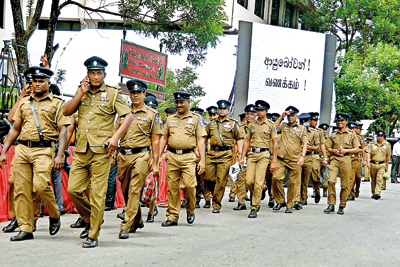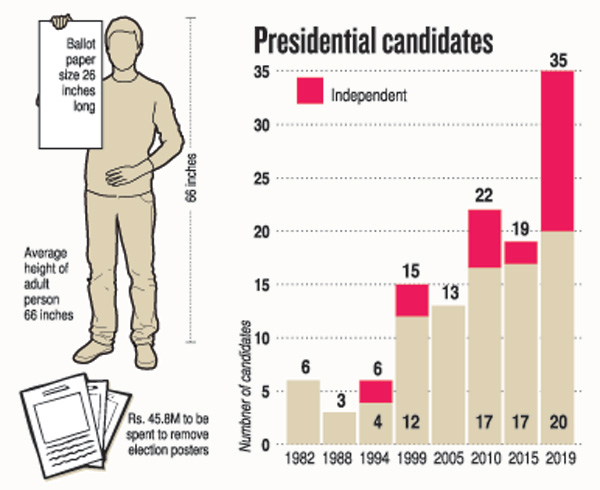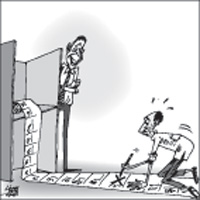News
Most crowded presidential poll: Problems galore, voter confusion feared
The record number of candidates contesting the 2019 Presidential Election has resulted in the budget for the election skyrocketing way beyond initial estimates, leaving a string of other complications, including more air time on state TV and radio and additional security arrangements.
This has also compelled election officials to take additional measures to ensure the smooth conduct of the polling.

Tight security on day of the nominations. Pix by Indika Handuwala
A total of 35 candidates are contesting the November 16 election, easily beating the record set at the 2010 presidential election when 22 candidates were in the fray. The record number of candidates, however, has created many headaches for the National Election Commission.
Earlier this week, the Commission received the model ballot paper from the Government Printer for the election. This draft ballot paper was 26 inches long.
Each candidate is entitled to send two agents to a polling centre and as many as five agents to a counting centre. With 35 candidates contesting the poll, it means that there will be 70 agents at each polling centre and up to 175 at each counting centre. This is in addition to the election officials and police officers on duty at each polling and counting centre.
Earlier this week, the Commission issued a statement, outlining the difficulties it faced. They included having to recheck all polling and counting centres and shifting them where possible to locations which had more room, having to increase the number of staff and assistant staff at centres due to the large number of ballot boxes that were needed and the increase in transport and welfare costs for staff due to more time being needed to count the votes.
The unusual length of the ballot paper is a major problem, National Election Commission Director General Saman Sri Rathnayake told the Sunday Times. “Our standard wooden ballot boxes will not be able to hold more than 400 ballot papers of this length.
“This means we will have to send more ballot boxes to polling centres based on the number of eligible voters in the ward. For example, we would need five such boxes for a polling centre having 2000 votes, whereas if the ballot paper’s length was less, we could have managed with only two. We now have to find three additional boxes from somewhere to send to this centre,” he explained.
Mr Rathnayake noted transporting arrangements would also have to be changed due to the length of the ballot papers. Since more ballot boxes would be needed for particular polling centres, it would mean that the type of vehicle used to transport them to polling centres and then over to counting centres would also have to change.
“If it was only a couple of boxes, a double cab would have sufficed, but more boxes mean, we would have to use a van. That means transport costs will rise. More labour will also be needed,” he said.
To mitigate these problems, the Elections Secretariat is currently exploring the possibility of importing plastic ballot boxes with more room.
The two-foot-long ballot paper also means that it would take time for the voters to select the candidate to vote and the counting longer time as the counting agent will have to unfold each ballot paper by hand.
The prospect of accommodating all the agents of the candidates at polling and counting centres is currently one of their chief concerns, the DG said.
He pointed out that the vast majority of centres used for polling and counting at elections are schools. School classroom halls in the country are usually 20×20 in size. But the sheer number of agents alone means such halls will not be enough.
“Imagine the scene at a counting centre. We have 175 agents together with about 60 of our own staff. We may be forced to set up temporary sheds due to lack of room,” Mr Rathnayake said. Additional costs would also be incurred to provide food and other facilities for those at the centres.
The DG said officials were working hard to mitigate logistical issues created by the situation, including shifting polling and counting centres where possible, though careful consideration is needed before doing that. “For example, we need to be sure that any place we shift to can be accessed by disabled voters.”
Meanwhile, District Secretaries, who will be the District Returning Officers at the election, said they are making arrangements to deal with the difficulties posed by the large number of candidates.
Galle District Secretary Somaratne Vidanapathirana acknowledged that officials would have to make extraordinary arrangements to accommodate all the agents of candidates and election staff. “We will need very large halls for this. It will also mean more will have to be spent on facilities such as water and electricity. But, as the election has been declared now, we will make every effort to ensure that problems are minimised.”
U. D.C. Jayalal, the Kalutara District Secretary, said the Pasdunrata National College of Education will be used as the base of operations in the district at this election. Ballot boxes for all polling centres in the district will be issued from this location. Once polling is concluded, the boxes will be transported back to the college and the counting will also take place there. The final district result too will be issued from this location.
“This college has far more room than a school. So we don’t envisage any issues there,” Mr Jayalal said, adding that they were also making arrangements to ensure voting goes smoothly at polling centres.
Gampaha District Secretary Sunil Jayalath said accommodating agents of 35 candidates would definitely pose enormous problems for them. “It becomes difficult once the number of candidates goes beyond 15, but we will have to try our best since they are all entitled to be there,” he remarked.
Mr Jayalath recalled that the ballot paper for the very first Presidential Election in 1982 was no longer than a postcard. He expressed fears that the length of the ballot paper for the 2019 election could confuse the voters and result in a large number of rejected votes. “People need time to find the candidate of their choice and mark their vote. Some may become flustered by having to look through such a long ballot paper with others waiting to vote. I hope more awareness is created on this before Election Day,” he said.
Senior Deputy Inspector General Jagath Abeysirigunawardena, who is in charge of elections, told the Sunday Times that candidates would be provided security after a threat assessment on them and accordingly a candidate who does not have a serious threat will be provided two police guards each.
He said if the counting centres were expanded in size to accommodate the agents, additional security would be provided. The SDIG said security arrangements would be discussed at a meeting next week with the NEC chairman and the Inspector General of Police.
In addition to providing security, the police are required to ensure that the election laws are not violated.
Mr. Abeysirigunawardena said additional expenses would be needed to pull down posters and cutouts.
Meanwhile, more candidates also mean having additional political party offices in each of the electorates.
Rohana Hettiarachchi, executive director of the People’s Action for Free and Fair Elections (PAFFREL) said, “In recent elections, an increasing number of candidates are entering the fray due to divisions within a party or a coalition and also to gain certain benefits.”
He said that during the presidential campaign, the benefits include publicity locally and internationally.
Commenting on the length of the ballot paper, Mr. Hettiarachchi said he believed the older people would face difficulties when voting. “They have to go through all the 35 names to recognise their particular candidate’s name and they are likely to make mistakes,” he said.
Mr. Hettiarachchi said new laws should be brought in to minimise the misue of elections to gain personal glory or benefits.
Tudor Weerasinghe , a Mass Media professor at the Sri Palee Campus University in Colombo, said that although there were calls that educated people should come forward to contest the election, all and sundry had entered the fray, undermining the importance of the office of the president.
He said one way of controlling the influx would be to increase the deposit money.
However, the Centre for Monitoring Election Violence CMEV National Coordinator Manjula Gajanayake said that more candidates in the fray indicate the power of democracy in the country.
He said if no candidate wins a majority in the first round of voting, second preference of those who voted for candidates other than the first two candidates would be counted and if still either of the first two candidates could cross the fifty percent bar, the third preference would be counted. This is a complicated process, and it is likely many voters would not mark their second of third preference.
The extra number of candidates has also given rise to a problem in allocating air time on state TV and radio. Each candidate is entitled to a 45 minute air time on TV to address the voters in Sinhala, Tamil or English. This would would mean a total air time of about 60 hours, if all candidates opt to use their air time.
Sri Lanka Rupavahini Corporation Director General Palitha Wijesinghe said, “We have allocated a week for this purpose. Every candidate will be given an equal opportunity. We have allocated 45 minutes per each candidate. We have rescheduled our programmes which was due to be telecast on Channel Eye.”
The Sunday Times spoke to some of the lesser known candidates to ask their views on the criticism over the large number of candidates.
W. Saman Prasanna Perera of the Power of People Party said there was a need to encourage the youth to take part in the elections. “I became a candidate because there is an urgent need to identify the causes of that led to the downfall of the country and work towards the country’s progress.
Ariyawansha Dissanayaka of the Democratic United National Front defending his candidacy said he entered the fray to give “our grandchildren” a better country.

